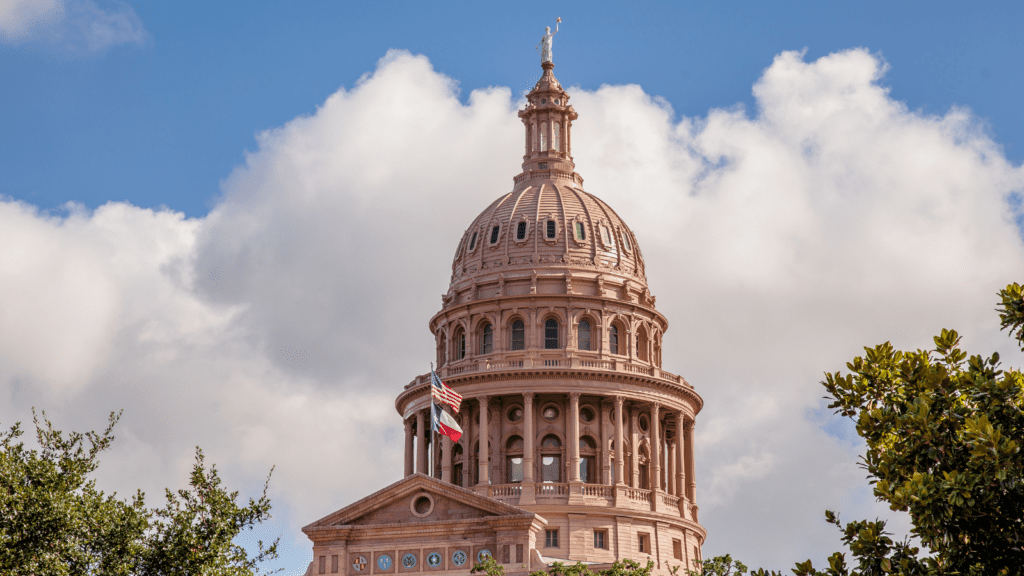
Return to October 2023 newsletter
Note: Content below was posted and current as of Oct. 18, 2023
Around the Texas Capitol:
Legislators go back to work, Texans prepare to vote
By Lauren Fairbanks and J Pete Laney
TAD Governmental Affairs
Cooler fall temperatures are on the horizon, but things started heating up in Austin when the Third Called Special Session of the 88th Legislature gaveled in on Oct. 9. Gov. Greg Abbott’s agenda for the session includes:
- EDUCATION FREEDOM: Legislation providing education savings accounts for all Texas school children.
- BORDER SECURITY:
- Legislation to do more to reduce illegal immigration by creating a criminal offense for illegal entry into this state from a foreign nation and authorizing all licensed peace officers to remove illegal immigrants from Texas.
- Legislation to impede illegal entry into Texas by increasing the penalties for criminal conduct involving the smuggling of persons or the operation of a stash house.
- Legislation to impede illegal entry into Texas by providing more funding for the construction, operation, and maintenance of border barrier infrastructure.
- PUBLIC SAFETY: Legislation concerning public safety, security, environmental quality, and property ownership in areas like the Colony Ridge development in Liberty County, Texas.
- ENDING COVID RESTRICTIONS: Legislation prohibiting COVID-19 vaccine mandates by private employers.
The governor has promised another special session if his priority items are not passed, which could lead to a very long fall in Austin ahead of the Nov. 7 election. While the only candidates on the ballot at the state level will be for the House District 2 special election in Hopkins, Hunt and Van Zandt counties, voters will have a lengthy ballot to consider when they head to the polls on Nov. 7. An historic 14 proposed constitutional amendments approved by the Texas Legislature earlier this year are on the ballot. The proposed amendments focus on issues that include right to farm, infrastructure funding and property tax relief.
A breakdown of each proposition is included below. Early voting starts Oct. 23 through Nov. 3. See you at the polls!
Propositions on the ballot:
- Proposition 1: All 50 states have enacted some version of right-to-farm laws, seeking to protect farmers and ranchers from nuisance lawsuits for carrying out their regular operations. This amendment would limit the circumstances in which a jurisdiction may impose requirements on operations.
- Proposition 2: Cities and counties would be allowed to exempt childcare providers from property taxes for any facilities used to run a childcare business.
- Proposition 3: Lawmakers would be required to ask voters for authorization before they could levy new state taxes on residents that would be based on their net worth or wealth.
- Proposition 4: Earlier this year, Texas lawmakers approved a $12.7 billion package of property tax cuts that needs voter approval in order to take effect. This amendment would send $7.1 billion to school districts to lower their property tax rates. It will also raise the state’s school district homestead exemption from $40,000 to $100,000.
- Proposition 5: The National Research University Fund would be renamed the Texas University Fund. The fund would gain annual interest income, dividends and investment earnings from Texas’ “Rainy Day Fund” to support research at state universities. Texas A&M University and University of Texas systems will not receive money from the fund since they receive research funds from a separate Permanent University Fund.
- Proposition 6: A specific fund would be created in the state treasury outside of the general revenue fund, endowed with a $1 billion down payment. The fund would be administered by the Texas Water Development Board to support a wide range of water infrastructure projects.
- Proposition 7: A state fund would be created to allow officials to distribute loans and grants to companies, motivating the creation of new natural gas-fueled power plants.
- Proposition 8: The Texas Broadband Infrastructure Fund would be created, and $1.5 billion would be allocated to expand internet availability in Texas, where about seven million people currently lack access. A portion of money also would be used to update 9-1-1 systems throughout the state.
- Proposition 9: Some retired Texas teachers would be provided with cost-of-living raises to their monthly pension checks, paid for by $3.3 billion moved from the general revenue fund to the retired teachers’ fund.
- Proposition 10: This Legislature would be allowed to exempt from ad valorem taxation equipment or inventory held by a manufacturer of medical or biomedical products to protect the Texas healthcare network and strengthen the medical supply chain.
- Proposition 11: The Legislature would be authorized to permit conservation and reclamation districts in El Paso County to issue bonds supported by ad valorem taxes to fund the development and maintenance of parks and recreational facilities. Eleven counties’ conservation and reclamation districts are currently permitted to issue bonds supported by property taxes to fund recreational development and improvement. This proposed amendment would add El Paso County to the list. Conservation and reclamation districts aid in managing stormwater storage, land irrigation and the conservation and development of forests within their designated boundaries.
- Proposition 12: The Galveston County’s office of the county treasurer would be abolished, and the Galveston County Commissioner’s Court would be allowed to employ or contract an existing county official or other qualified person to complete tasks instead.
- Proposition 13: State judges would be allowed to retire at 79, instead of the current mandatory retirement age of 75. The minimum retirement age would be increased from 70 to 75 for state judges.
- Proposition 14: More than $1 billion would be invested in state parks, providing for the creation of the centennial parks conservation fund to be used for the creation and improvement of state parks.


